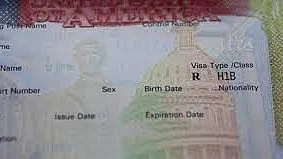US justice dept’s stricter H-1B rules put Indian workers on edge
Indian nationals account for over 70 pc of H-1B visas, driven by a large talent pool and backlog of applicants

The United States Department of Justice (DoJ) has escalated its oversight of the H-1B visa programme, opening multiple investigations into employers accused of overlooking American citizens in favour of foreign workers. The move has far-reaching implications for Indian professionals, who account for the majority of H-1B recipients each year, as well as for Indian students aspiring to build careers in the US.
The initiative is being led by Harmeet Dhillon, the India-born assistant attorney general for civil rights, who was appointed to the post by President Donald Trump shortly after his election victory in December last year.
Announcing the fresh crackdown on Thursday, Dhillon confirmed that “several” investigations were already under way and urged workers and employers to report discriminatory practices. “Send us your leads,” she said, encouraging Americans to use the DoJ hotline to highlight instances of bias.
The H-1B programme, capped at 85,000 visas annually, allows US companies to recruit skilled foreign professionals in critical sectors such as technology and engineering. However, the system has long been criticised by some policymakers and industry leaders, who argue it enables outsourcing firms to undercut wages and replace American workers with cheaper foreign talent.
US commerce secretary Howard Lutnick went so far as to describe the current H-1B framework as “a scam” in a television interview earlier this week, calling on companies to give priority to domestic hires. Florida Governor Ron DeSantis echoed these concerns, branding the scheme a “cottage industry” that disadvantages local workers.
Among the practices under investigation are job postings that specifically target H-1B candidates while excluding US citizens, cases of displacement where American employees are laid off while visa holders are retained, and wage disparities in which foreign workers are paid less than their domestic counterparts for identical roles.
The justice department is also probing whether some “H-1B dependent” firms are failing to meet statutory obligations to recruit US citizens before hiring from overseas, as well as allegations of fraud in the lottery-based application system. Employers accused of submitting multiple applications for the same candidate to improve their odds are also under the scanner.
Oversight measures include targeted site visits to firms with large numbers of H-1B workers, companies with unverifiable credentials, and workplaces where foreign workers are contracted out off-site.
In cases where violations are found, the DoJ has promised penalties and possible legal action. The Department of Homeland Security, meanwhile, is considering policy reforms such as replacing the current lottery system with a weighted selection process.
The Trump administration has also signalled wider immigration changes, unveiling plans to restrict international student visas by imposing a four-year cap. India, which sends the largest number of students to the US and was more than 330,000 in 2024, is expected to be particularly affected by these proposals.
For India, the heightened scrutiny poses significant risks. Indian nationals have historically secured more than 70 per cent of all H-1B visas, a dominance attributed to both the country’s deep pool of skilled engineers and the large backlog of applicants.
Stricter enforcement could reduce opportunities for Indian professionals, especially in the IT sector, where companies such as Infosys, TCS, Wipro, Cognizant and HCL rely heavily on US contracts. Entry-level graduates may also find themselves disadvantaged if new merit- or wage-based criteria are introduced, as these typically favour experienced or higher-paid applicants.
The ripple effects could extend to Indian IT exports, with a potential slowdown in contract wins from US clients. Experts warn that this could prompt Indian professionals to seek alternative destinations or increase retention of skilled talent within India, boosting domestic industry competitiveness.
At the same time, tighter student visa rules may dissuade future aspirants, creating uncertainty for Indian families investing in higher education in the United States.
While critics of the H-1B system argue that reforms are necessary to protect American workers, many business and immigration specialists caution that excessive restrictions could backfire by undermining the US’s ability to attract global talent and sustain innovation.
India’s technology sector, which has long acted as a pipeline of skilled labour to Silicon Valley and beyond, is now weighing how to adapt through upskilling initiatives and by expanding to new markets.
The DoJ’s sharpened focus marks a decisive moment in the debate over skilled immigration. With investigations gathering pace and policy changes under consideration, both American and Indian stakeholders are bracing for a shift that could reshape employment and education opportunities across borders.
With IANS inputs
Follow us on: Facebook, Twitter, Google News, Instagram
Join our official telegram channel (@nationalherald) and stay updated with the latest headlines
